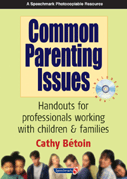 by Cathy Bin
by Cathy Bin
This CD-ROM resource pack has been designed for professionals working with children and families, and is an invaluable asset for health centres, children's centres, playgroups, nurseries or schools.
Full Description:
Each of the handouts focus on a single issue. Topics include sleep, eating, behaviour, language and communication delays, attention deficits, sibling relationships, anxiety, jealousy, depression, bullying, death, divorce and trauma.
Designed as a high-quality leaflet, the 51 four-page handouts can be printed directly from the CD or photocopied from the book and either made available to individuals, or used to develop an accessible information rack for parents.
The leaflets cover the full range of issues encountered by parents of children up to the age of sixteen, and provide clearly written guidance on how to help children with some of the common problems encountered in family life.
This is a practical resource with a wide range of applications that will be of particular use to surgeries, family centres, community mental health teams, schools, nurseries, social workers, and psychology or psychiatry departments.
Readership
Any professional working directly with children and families: health visitors, school nurses, nursery nurses, teachers, psychologists (clinical and educational), child psychiatrists, paediatricians, speech & language therapists, OTs, multi-disciplinary teams, social workers and GPs.
About the authors
Cathy B鴯in is a Chartered Clinical Child Psychologist. Her specialist area of interest has been multi-disciplinary support to families with children with developmental delays. She has experience of taking out-patient referrals for families with children from birth to sixteen with a full range of developmental and health problems. She is also a qualified primary teacher and parent of three children.
112pp, A4, wire-o-bound with a CD-ROM
Contents
Preface
Introduction
Index of leaflets for professionals and parents
1 Welcome to our Child Development Service
2 Carrying out your own developmental assessment: 0-5 years
3 Using a developmental assessment to support early intervention with your child
4 Carrying out your own developmental assessment: 6-16 years
5 Looking at your family history
6 Parenting children from birth to 16 years
7 How stress affects parenting, and how to help yourself
8 Helpful patterns in healthy families
9 What is assertiveness and how can it help parenting?
10 Encouraging a secure attachment between you and your child
11 Thinking about thoughts
12 Finding calm in a challenging world
13 Encouraging eye contact: the beginnings of social communication
14 Songs and rhymes to develop language, attention and play skills
15 Choosing toys to help your child's development
16 Helping children learn the art of happiness
17 Supporting your child's self-confidence, self-esteem and optimism
18 Building your child's self-esteem and confidence
19 Helping your child develop concentration skills and maturity
20 Helping babies and young children develop good sleep patterns
21 Helping children eat well
22 Playing with your baby: helping your baby and yourself
23 Helping young children learn to talk
24 Encouraging good behaviour
25 Encouraging good behaviour in children with disabilities
26 Using praise effectively
27 Hitting and kicking, spitting, biting and swearing
28 Playing with your child: helping your child and yourself
29 Time for your teenager: helping your teenager and yourself
30 Learning to listen: helping children with their feelings
31 Helping siblings to get on with each other
32 Helping temperamentally challenging children
33 Helping children with fears and anxiety
34 Helping children with jealousy
35 Coping with irritability, sulking and a quick temper
36 Helping children and adults with depression
37 Understanding guilt and shame
38 Could my child have an Autistic Spectrum Disorder, and how can I help?
39 Could my child have Attention Deficit Hyperactivity Disorder (ADHD), and how can I help?
40 Could my child have developmental dyspraxia, and how can I help?
41 Could my child have dyslexia, and how can I help?
42 Obsessive-compulsive and repetitive behaviours, and how to help your child
43 Wetting and soiling, and how to help your child
44 Helping children with separation and divorce
45 Helping children with death and loss
46 Helping children cope with trauma
47 Helping children cope with bullying and teasing
48 My child may have some special educational needs - what should I do?
49 Supporting children with writing
50 Supporting children with mathematics
51 Becoming a parent of a child with a disability
Stock: BACKORDERED
|